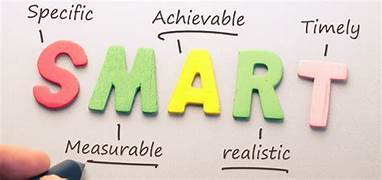
Setting up SMART goals to help us make lifestyle changes is something that may be foreign to some and somewhat difficult for others – even if they are very competent with setting goals at work. The harder part with goal setting is being realistic and specific. And obviously the accountability is critical for us to keep us on track.
Here are some key points to keep in mind when setting up your own SMART goals:
1.Specific: Goals should be clearly defined in simple terms so that you know what you are aiming for. For example – I want to lose 20 lb in 6 months is specific –however, it’s not an action oriented goal – you can’t just “will” yourself to lose 20 lb. A specific goal might be “I will aim to lose 2 lb this week, by doing….something (s). I will aim to drink 12 glasses water each day this week or I will aim to do a 30-minute walk at least 4 days this week is more specific. Although I want to lose 2 lb this week is specific – it’s not a SMART goal, since it doesn’t have the other important aspects to it.
2. Measurable: Goals should be quantifiable so that progress can be measured, making it easier to see if you're on track. I think this is self explanatory – however stating “I will drink more water is not measurable” but if I say I will aim to drink at least 3 glasses of water daily this week – is something you can measure – and notice change. I like to use the word “aim” for. Realistically if you drink 4 glasses of water 5 days this week and 2 glasses 2 days this week – you have still met your goal. If this were the case, the following week, I might suggest keeping the same goal as we want to develop more consistent behaviour before “upping” the goal.
3. Achievable: Goals should be challenging, but also attainable within your current situation, timeframe, and resources. Think about your own situation – and what you typically do now and then set a goal that is reasonable, a bit awkward and attainable but may not be what you ultimately think it should be. Remind yourself that it takes small steps to work towards something bigger. For example, aiming for the classic 8 glasses of water daily is not achievable for someone who drinks one glass of water daily. It doesn’t feel good to achieve something for one week, only to go back to old habits and think you can’t do it.
4. Relevant: Goals should be relevant to your personal development, helping you move closer to your overall objectives. So if your goal is weight loss, having a goal that is financially oriented would not help you. This probably seems obvious. Keep your personal goals related to your ultimate lifestyle goal.
5. Time-bound: Goals should have a deadline, creating a sense of urgency to motivate you to act and work on achieving them. So, working out 3x a week is time bound. Then the next step is creating a doable plan to make it happen – and of course making it more specific to your needs.
Setting and achieving SMART goals is an ongoing process if you want to produce a change. Often, we need to revisit – and re-work our goals and actions until they become a habit. Life throws us curveballs – and we may have to regroup or reset our goals because they just weren’t achievable. Without regrouping, we don’t end up achieving our ultimate goals of living a healthier lifestyle, improving our health, reducing our need for medication, or losing weight or body fat that we wanted to achieve.
Keep in mind that we all have lots of responsibilities, and making lifestyle changes is only one of those things.
Remember, it's essential to keep in mind that setting realistic SMART goals involves defining the problem you want to solve, creating a plan to achieve it, and regularly monitoring progress towards achieving it.
I’m happy to assist you with this. Please don’t hesitate to contact me.





